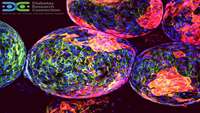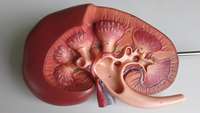Cerebral organoids at the air-liquid interface generate nerve tracts with functional output
Cerebral organoids, also sometimes called mini-brains or brain organoids, have become an important and useful tool in understanding human brain development and disease.
Research implicates causative genes in osteoporosis, suggesting new targets for future therapy
Scientists have harnessed powerful data analysis tools and three-dimensional studies of genomic geography to implicate new risk genes for osteoporosis, the chronic bone-weakening condition that affects millions of people. Knowing the causative genes may later open the door to more effective treatments.
Bluebird prices gene therapy at 1.58 million euros over 5 years
Bluebird bio Inc on Friday set a price for its gene therapy, Zynteglo, at 1.58 million euros ($1.78 million) over five years, after winning conditional approval in Europe this month to treat a rare genetic blood disorder.
Immune-repelling protein prolongs function, survival of human stem-cell-derived beta cells
Encapsulating human stem-cell-derived beta cells in microcapsules made with a protein that repels key immune cells restored glucose metabolism in diabetic mice and protected the cells from immune system attack, preventing the buildup of inflammatory fibrotic tissue that has plagued previous trials of encapsulated beta cells.
Biologists find a way to boost intestinal stem cell populations
Cells that line the intestinal tract are replaced every few days, a high rate of turnover that relies on a healthy population of intestinal stem cells. MIT and University of Tokyo biologists have now found that aging takes a toll on intestinal stem cells and may contribute to increased susceptibility to disorders of the gastrointestinal tract.
Targeting stem-like cells could prevent ovarian cancer recurrence
Ovarian cancer is not the most common form of cancer, but it’s among the deadliest. That’s because about 70 percent of cases recur. A new study by researchers at the University of Pittsburgh, UPMC Hillman Cancer Center, Magee-Womens Research Institute (MWRI) and several other collaborating institutions targets the root of recurrence with new drugs aimed at annihilating stem-like ovarian cancer cells.
Cell therapy could replace need for kidney transplants
Wake Forest Institute for Regenerative Medicine (WFIRM) scientists are working on a promising approach for treatment of chronic kidney disease—regeneration of damaged tissues using therapeutic cells.
Harnessing T-cell stemness could enhance cancer immunotherapy
A new study led by scientists in the Center for Cancer Research (CCR) at the National Cancer Institute (NCI) sheds light on one way tumors may continue to grow despite the presence of cancer-killing immune cells. The findings, published March 29, 2019, in Science, suggest a way to enhance the effectiveness of immunotherapies for cancer treatment. NCI is part of the National Institutes of Health.
Using gene editing, neuroscientists develop a new model for autism
Using the genome-editing system CRISPR, researchers at MIT and in China have engineered macaque monkeys to express a gene mutation linked to autism and other neurodevelopmental disorders in humans.
Study gives new perspective on production of blood cells and immune cells
A healthy adult makes about 2 million blood cells every second, and 99 percent of them are oxygen-carrying red blood cells. The other one percent are platelets and the various white blood cells of the immune system.












